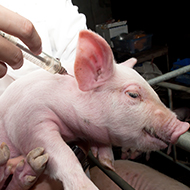
The findings could lead to new human treatments.
Scientists investigating pigs’ response immune response to influenza have, for the first time, identified specific cells that are crucial in the fight against infection and for providing long-term protection against illness.
In the study, researchers at the Pirbright Institute found four types of T cells that target host cells infected with viruses and kill them to prevent the virus from spreading.
It is hoped that the findings will shed more light on how the human immune system adapts to flu and lead to the development of new vaccines.
Dr Elma Tchilian, head of the mucosal immunology group at Pirbright explains: “These findings may prove to be crucial for the design of future vaccines against respiratory diseases. Tissue resident memory (TRM) cells are important in respiratory diseases such as influenza and COVID-19 and identifying, in detail, where they are located in a relevant animal model is important for our understanding of disease in pigs."
“This knowledge is also highly relevant to human disease. For the first time, we describe the distribution of cells involved in the immune response and their activity over the course of natural infection or vaccination and these are important knowledge gaps to fill.”
Published in Mucosal Immunology, the study examined the apadative response of CD8 T cells. These are cells that specifically target host cells infected with viruses and kill them to prevent the viruses from spreading.
The team identified four different types of CD8 T cells - naïve, central memory, effector memory and differentiated effector porcine CD8 T cells - and focussed on the tissues where the cells are found. Their results show that the pig immune response is different to that seen in small animals like mice or ferrets, which are not natural hosts for influenza.
The team also revealed the location of D8 T cells in different pig tissues and how they respond to infection. Until now, it was thought that the number of T cells in the lungs declines rapidly after infection, however, this research shows that this is not the case, suggesting longer-lasting protection against future infection.



 The RCVS has announced a new version of its 1CPD mobile app, with enhanced features for veterinary surgeons and veterinary nurses to record their continuing professional development.
The RCVS has announced a new version of its 1CPD mobile app, with enhanced features for veterinary surgeons and veterinary nurses to record their continuing professional development.